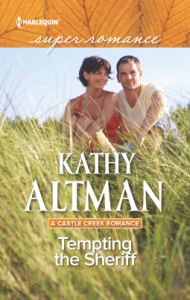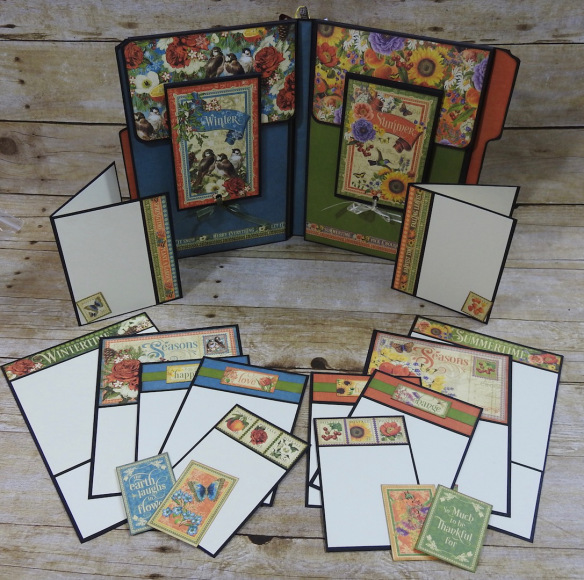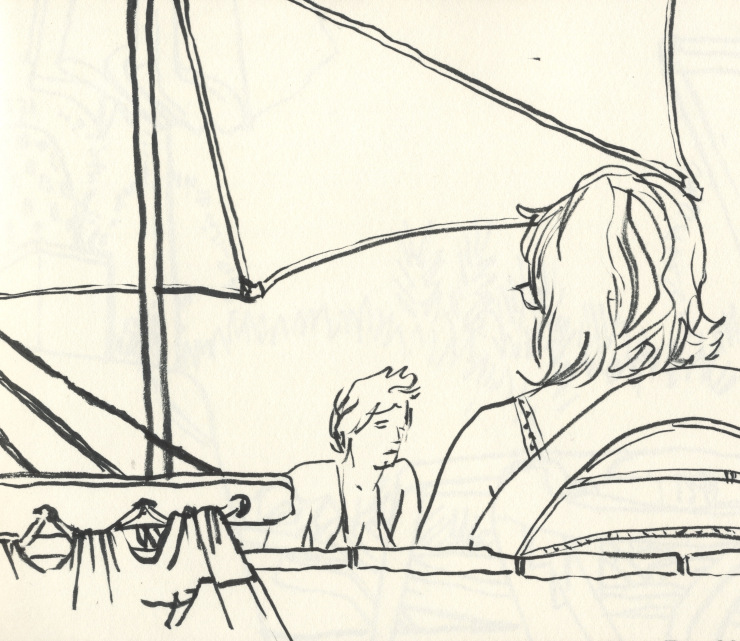 Miss Bates read Kathy Altman’s Tempting the Sheriff with great joy amidst reader-mourning. Harlequin Books recently announced it would end the Superromance line in June 2018. The line has been a MissB favourite for ages. In its titles, she discovered many favourite romance writers, Sarah Mayberry, Janice Kay Johnson, and more recently, Liz Talley. Altman, on the other hand, wasn’t as prolific, but MissB remembers Altman’s first, The Other Soldier, and how she loved it. With Altman’s fourth, Miss Bates can see that, like JKJohnson, Altman had the potential to be another Superromance favourite. (Sadly, not to be.) Tempting the Sheriff is a great romance in the JKJohnsonian vein. As small-town romances go, it doesn’t paint a halcyon picture of small-town life and its denizens. Castle Creek’s citizens are nosy, eccentric, chaotic (sometimes as lovably as Jodi Thomas’s), and occasionally shiftless, sometimes rowdy; they behave lovingly, but also criminally. Small-town life is close and neighbours do know and help each other, but they also feud and sometimes, small-town life is, well, boring. Into this Pennsylvania town, Altman introduces her hero and heroine: visiting Erie cop, Vaughn Fulton in Castle Creek to sell the house he inherited from an uncle and Sheriff Lily Tate, workaholic town protector haunted by personal tragedy. Vaughn and Lily must work together when the mayor temporarily hires Vaughn to fill in as Lily’s deputy.
Miss Bates read Kathy Altman’s Tempting the Sheriff with great joy amidst reader-mourning. Harlequin Books recently announced it would end the Superromance line in June 2018. The line has been a MissB favourite for ages. In its titles, she discovered many favourite romance writers, Sarah Mayberry, Janice Kay Johnson, and more recently, Liz Talley. Altman, on the other hand, wasn’t as prolific, but MissB remembers Altman’s first, The Other Soldier, and how she loved it. With Altman’s fourth, Miss Bates can see that, like JKJohnson, Altman had the potential to be another Superromance favourite. (Sadly, not to be.) Tempting the Sheriff is a great romance in the JKJohnsonian vein. As small-town romances go, it doesn’t paint a halcyon picture of small-town life and its denizens. Castle Creek’s citizens are nosy, eccentric, chaotic (sometimes as lovably as Jodi Thomas’s), and occasionally shiftless, sometimes rowdy; they behave lovingly, but also criminally. Small-town life is close and neighbours do know and help each other, but they also feud and sometimes, small-town life is, well, boring. Into this Pennsylvania town, Altman introduces her hero and heroine: visiting Erie cop, Vaughn Fulton in Castle Creek to sell the house he inherited from an uncle and Sheriff Lily Tate, workaholic town protector haunted by personal tragedy. Vaughn and Lily must work together when the mayor temporarily hires Vaughn to fill in as Lily’s deputy.
Altman does so much right in Tempting the Sheriff, rejecting conventions to pen a satisfying, heart-clenching romance. Her realistic portrayal of small-town life isn’t the only unconventional aspect. For example, the reader expectation that the eponymous sheriff is male is turned on its head in Sheriff Lily Tate. Moreover, there is a daring and welcome age difference between Vaughn and Lily. Nothing squicky, folks: her 39 to his 28, but unusual for romance. Miss Bates thought it terrific: Lily’s age does add strain to their relationship, as it realistically should, given society’s smirky moues about older women and younger men. Like small-town life, Altman manages to develop and build a compelling give-and-take, care-and-hurt relationship between Vaughn and Lily, showing a deepening of care leading to love, as well as the misunderstandings that come of navigating a new relationship.
Altman is a pithy and succinct writer, contributing to her ability to develop her characters. Despite the work environment and age difference strictures, Altman gives hero and heroine a healthy dose of physical attraction with panache-y humour: cases in point, “this guy seemed to carry all his smarts in his ass,” says Lily and Vaughn retorts, “he had never been able to resist a woman in uniform.” Altman establishes character and takes a good poke at male/female romance stereotypes. Vaughn is a kittens-and-kids softie, evident when he discovers a cat and her brood in his uncle’s empty house: “he’d hauled his ass out of bed pretty much on the hour to check that everyone was still breathing.” He is, in turn, a by-the-book cop, which is beautifully contrasted to Lily’s recklessness, the identifier of every romance suspense and Western hero-as-sheriff romance. Miss Bates loved Vaughn’s response to Lily’s physical daring-do: ” ‘ … you deliberately stepped in front of a moving vehicle. Why would you take that kind of risk? … We’re supposed to be a team. You know what a team is, right? People who work together?’ ” Lily’s role as the lone-wolf protector and shield of town justice is taken out of the alpha-sheriff book – except in Altman’s case, all those “qualities” are embedded in her heroine!
Still in keeping with her character-stereotype reversal, Altman softens, humanizes, and deepens Lily and Vaughn, individually and as a couple. Though Lily and Vaughn are attracted to each other, they are cautious about voicing, or acting on that attraction, another kudo to Altman for resisting the romance-writer’s insta-lust cop-out.





